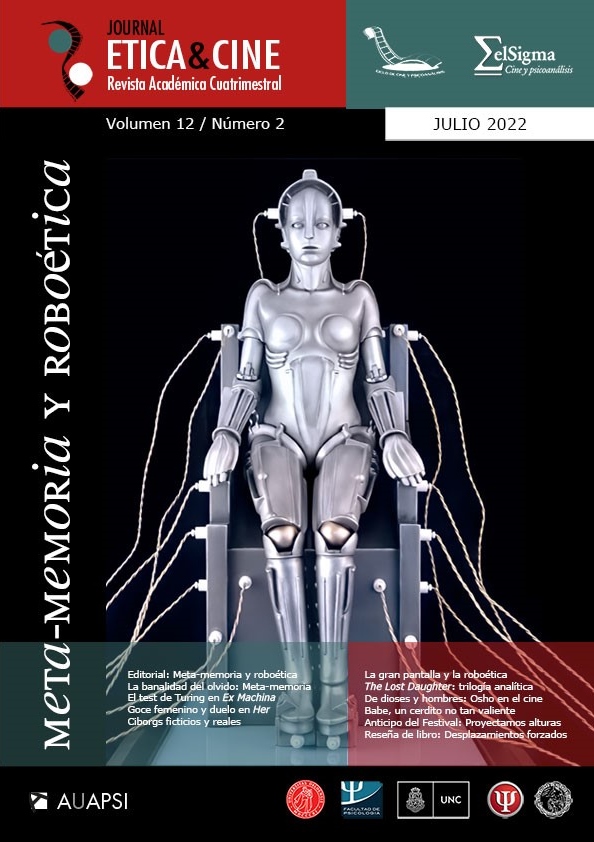Babe, un cerdito no tan valiente
DOI:
https://doi.org/10.31056/2250.5415.v12.n2.38333Palabras clave:
Cine, Bioética, Ética animal, Animales de granja, Construcción social, EspecismoResumen
Babe, el cerdito valiente es una obra cinematográfica que se ha utilizado generalmente como una fábula con la moraleja de que cada quién es dueño de su destino, pero una mirada crítica de la película revela que la película nos enseña una verdad cruel ‘si no quieres ser alimento debes ayudar a cuidar a los animales-alimento’. Desde la antropomorfización de los animales como sujetos narrativos que dentro de su animalidad tienen una historia de vida que contar, esta película expone la forma como el ser humano ha clasificado a los animales según parámetros arbitrarios como el uso y la inconformidad de algunos de los animales por el lugar que el humano les ha dado en el mundo. A partir de la búsqueda por no ser la cena del pato Ferdinand y el joven cerdo Babe, pretendo exponer la necesidad de ser un animal indispensable en el mundo humano, el individualismo que trae consigo esta búsqueda y el alto costo que se deriva de ser emancipado de la categoría alimento.
Referencias
American Humane Association. Babe (1995). No Animals Were Harmed a program of American Humane. Recuperado el 15 de junio de 2020 de https://humanehollywood.org/production/babe/
Aristóteles. (1988). Política. M, García Valdés. (Trad.). Editorial Gredos.
Arluke, A. & Sanders, C. (1996). Regarding animals. Temple University Press Philadelphia.
DeMello, M. (2012). The Social Construction of Animals. En: Animals and Society: An Introduction to Human-Animal Studies. Columbia University Press.
Douglas, M. (1973). Pureza y Peligro. Editorial Siglo XXI.
Guthrie, S. (2013. Encyclopedia of Science and Religions. Springer Reference.
Heldke, L. (2011). A Pragmatism Philosophical Consideration of the Pig in Literature, Song and Film, With Special Emphasis on the Ones That Got Away. En: Issues in Ethics and Animal Rights. Astral.
Horta, O. (2010). What is speciesism? The Journal of Agricultural and Environmental Ethics, 23, pp. 243-266.
Michel Fariña, J., & Solbakk, J. (2012). (Bio)ética: el cine como moderno teatro griego. En: (Bio)ética y cine, tragedia griega y acontecimiento del cuerpo. Letra Viva.
Nobis, N. (2009). The Babe Vegetarians: bioethics, animal minds and moral methodology. En: Bioethics at the movies. The John Hopkins University Press.
Noonan, C. (Director). (1995). Babe [Película]. Kennedy Miller Productions.
Orwell, G. (2019). Rebelión en la granja. Debolsillo
Plumwood, V. (2012). ‘Babe’: The tale of the speaking meat. En: The Eye of the Crocodile. Australian National University Press.
Simon, J. (2002). Anthropomorphism: The Non-Human as Human. En: Animal Rights and the Politics of Literary Representation. Palgrave Macmillan.
Singer, P. (2011). Liberación Animal. Trotta.
Stibe, A. (2001). Language, Power and The Social Construction. Society and Animals, 9(2), pp. 145-161.
The New York Times. (enero 7 de 2011). Dick King-Smith, Author Whose Novel Inspired ‘Babe’, Dies at 88. The New York Times. https://www.nytimes.com/2011/01/08/books/08smith.html
Descargas
Publicado
Número
Sección
Licencia
Derechos de autor 2022 Ética y Cine Journal

Esta obra está bajo una licencia internacional Creative Commons Atribución-CompartirIgual 4.0.
Los autores que publiquen en Ética y Cine Journal aceptan las siguientes condiciones:
Los autores/as conservan los derechos de autor © y permiten la publicación a Ética y Cine Journal, bajo licencia CC BY-SA / Reconocimiento - Reconocimiento-CompartirIgual 4.0 Internacional. La adopción de esta licencia permite copiar, redistribuir, comunicar públicamente la obra, reconociendo los créditos de la misma, y construir sobre el material publicado, debiendo otorgar el crédito apropiado a través de un enlace a la licencia e indicando si se realizaron cambios.

Este obra está bajo una licencia de Creative Commons Reconocimiento-CompartirIgual 4.0 Internacional.




